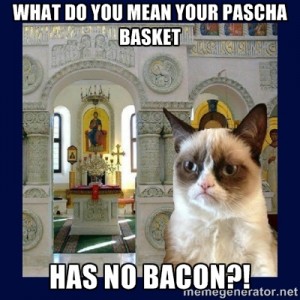The Joy of Bacon
With just a few days left before Pascha, the dominant logismoi distracting me from proper prayer (and analysis) is … bacon. I love it. I especially love the really fatty kind that just melts in your mouth. The best of the best is fried salo, a sort of bacon cut so that it isn’t anything but but pure unadulterated pig fat (salo is surely one of the greatest delights of being Ukrainian Orthodox!). And is there any better sandwich in the world than a toasted BLT? 
What Do You Mean, God Doesn’t Like Bacon?
For me, bacon is one of the ineffable proofs that God is real. When a nice greasy chunk of it melts in my mouth, I have no doubt about God or His love for me and all mankind. But that’s not the way it is for everyone. Muslims and Jews that follow the halal and kosher rules are forbidden to eat bacon. They believe that bacon is the unclean meat of an unclean animal and that eating it would render them impure. Nor is this just an idea derived from the study of scripture: it is a visceral moral instinct. This is hard for most Westerners to understand. As Moral Psychologist Jonathan Haidt and others have found, Americans – and especially American liberals – do not have a well developed sense of purity, holiness, or the sacred. We just don’t feel it. On the other hand, observant Muslims and Jews do. Strongly. This feeling is reinforced by a lifetime of rituals, examples, and lessons. It is automatic. As a result, Jews and Muslims have a strong negative automatic aversion to pork; an aversion that they believe is holy.
Orthodox Christians also have a strong instinct for purity, holiness, and the sacred; similarly reinforced by a lifetime of rituals, examples, and lessons, … but we know better than to extend it to something as wonderful and blessed as bacon! In fact, we (along with the vast majority of Americans) know that there is no REAL divine prohibition on eating pork: the Hebrew prohibition has been superseded and the Muslim prohibition was never real. I (along with the majority of Americans) know that there is no REAL reason (outside of dietary and liturgical fasting) for us NOT to have bacon. AND WE NEED OUR BACON!
[WARNING: SATIRE APPROACHING]
Therefore, I find it an offense against God, nature, and my “pursuit of happiness” that Halal butchers refuse to sell me bacon and that Kosher delis refuse to sell me BLT’s. After all, my religion allows (and sometimes even encourages, as in the traditional Ukrainian Paschal/Easter Basket) me to eat pork… but these businesses are refusing to sell me pork because they are still clinging to outdated and discriminatory prohibitions. Yes, they will still sell me steaks of any size and cut and the best bagels with chives and lox (two more foods that are proof of God’s love for mankind), but I want my pork! No, neither pork nor BLT’s are listed on their respective menus – but they should be! They sell other people exactly what they want, why not me?! Yes, I can go to the butcher and deli down the street to get exactly what I want without offending anyone’s deep-felt religious sensibilities, but I am an Entitled and Easily-Outraged American Consumer that wants something AND I WILL NOT BE DENIED!
We may not have an instinct for purity, but a visceral instinctive reaction to perceived unfairness (filtered through and defined by our narcissism)? That is a moral instinct Americans have in abundance.
The Protection of Religious Minorities (especially ones we don’t like or agree with)
Finding the right mix between religious freedom and other things is not always easy. For millennia, the solution was for the people in charge to define the religious obligations and everyone just had to deal with it as best they could. This is still the norm in many places. The blessed founders of this country saw that this led to discrimination and persecution, especially against religious minorities. They tried to protect Americans from this kind of tyranny by (among other things) enacting the First Amendment, and it has worked pretty well (the counter-factual is whether minorities would have been worse off without its protections – is there any doubt of that?).
The current spirit of the times has no respect for the religious sensibilities of traditionally-minded minorities, be they Jewish, Muslim, or Christian; unfortunately, that same spirit also has little patience for the First Amendment and the laws that reinforce its protections.
Most Americans do not understand why observant Muslims and Jews do not eat or sell pork, but we respect their right to adapt their lifestyles and the menus of the businesses they run accordingly. If we are too inconvenienced (or offended) by their practices, we will not do business at their shops. It seems that most  Americans (and certainly most liberals) do not understand why traditionalist Christian believers do not bless or participate in same-sex marriage ceremonies. But unlike Kosher and Halal businesses, Americans (or at least media and political liberals) increasingly challenge the right of traditionalist Christians to have their corporate “menus” reflect their (instinctive and doctrinally-sanctioned) traditionalist sensibilities. This is why rules like Indiana’s are necessary: they require that the government’s “need” for a given action be weighed against the damage the action would do to the religious sensibilities of those involved, and that if something must be done (i.e. the government’s “need” outweighs the damage), the government has to use the most limited action possible.
Americans (and certainly most liberals) do not understand why traditionalist Christian believers do not bless or participate in same-sex marriage ceremonies. But unlike Kosher and Halal businesses, Americans (or at least media and political liberals) increasingly challenge the right of traditionalist Christians to have their corporate “menus” reflect their (instinctive and doctrinally-sanctioned) traditionalist sensibilities. This is why rules like Indiana’s are necessary: they require that the government’s “need” for a given action be weighed against the damage the action would do to the religious sensibilities of those involved, and that if something must be done (i.e. the government’s “need” outweighs the damage), the government has to use the most limited action possible.
Conclusion: serve lamb!
In the media and administration-driven hysteria over the Indiana law, the alleged “need” would be to protect gay rights and the alleged “damage” would be to protect the right of religious people to control what goods and services they offer. As a libertarian, it seems to me that there is no compelling need for action. If people are too inconvenienced (or outraged) by the restrictive menus of traditional Christian bakers and other corporations (to include churches), they can do their business at other places whose menus better match their needs.
But it’s important to remember that everyone is still invited to have amazing bagels at the respectable Kosher deli, incredible shawarmas at the respectable Halal vendor, good bavarian cream eclairs at the respectable Christian baker … and good old-fashioned love, community, repentance, forgiveness, and salvation at respectable Orthodox Christian Churches.

The media spin on topics such as these makes my head spin. There is a complete contrast between this Charles M Blow Op-Ed article to that of David Brooks call for respectful politeness just the day before. This fellow has certainly “drunk the Kool-aid” of distortion put forth everywhere and often by the media of late.
Statements such as “the bill provides the possibility that religion could be used as a basis of discrimination against some customers.” (Italics by dap) are totally contrived and do not have any factual basis.
He objects that the bill protects companies and corporations in addition to individuals, yet when companies such as Walmart step out to object, their sincerity is questioned –” a moral issue being driven by consumerism considerations.” –and “Big business had more to lose by appearing intolerant than small businesses had to gain by hewing to an exclusionary holiness.” There’s nothing making him happy.
If we weren’t such a litigious society, we wouldn’t need protections such as those provided by laws such as the Indiana RFRA. If you don’t like someone’s opinion or view of things, take your ball, money or whatever and go elsewhere. Don’t call people names and don’t degrade their differences. Just exhibit the tolerance and respect of them that you would want to receive. Didn’t they learn this in kindergarten? Maybe that’s the problem.
Here’s the link –http://www.nytimes.com/2015/04/02/opinion/charles-blow-religious-freedom-vs-individual-equality.html?hp&action=click&pgtype=Homepage&module=c-column-top-span-region®ion=c-column-top-span-region&WT.nav=c-column-top-span-region